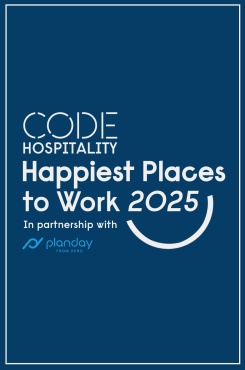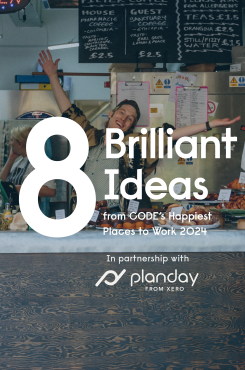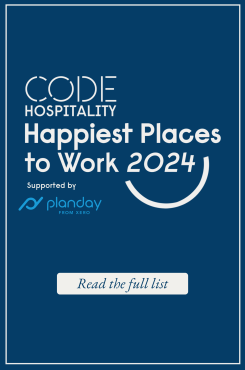A Restaurant Where The Staff Can Thrive
Published 17 April 2025
By Hilary Armstrong
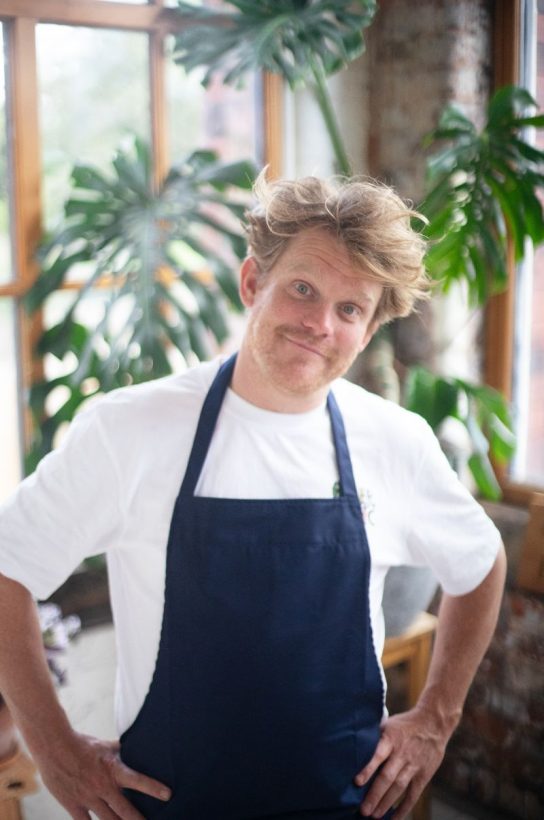
With applications now coming in for this year’s Hospitality’s Happiest Places to Work campaign, in partnership with Planday, we took the opportunity to catch up with Samuel Buckley, the chef and founder of one of last year’s winners A Restaurant Where The Light Gets In, a pioneer of purpose-led, sustainable hospitality in Stockport. Here he tells us about his plans for the restaurant, his love of St. John, and why staff well-being has never been more important.
When CODE gets Sam Buckley of Where The Light Gets In in Stockport on the phone to talk about staff welfare and workplace culture, the chef is in the preservation room at his restaurant, knee-deep in vinegars, ferments, pickles and preserves. The restaurant is closed but he’s happy to be there, sorting through the clutter, tasting as he goes, Kamasi Washington blasting from the speakers.
“I’ll tell you what I’m doing at the moment. I’m cleaning all these rooms, getting rid of all the clutter. I’m going to have all the back rooms painted, the office redone, and I’m trying to create a calm space with a good solid library and a digital library where the team can have access to things like Bloomsbury [Food Library] and Vittles.”
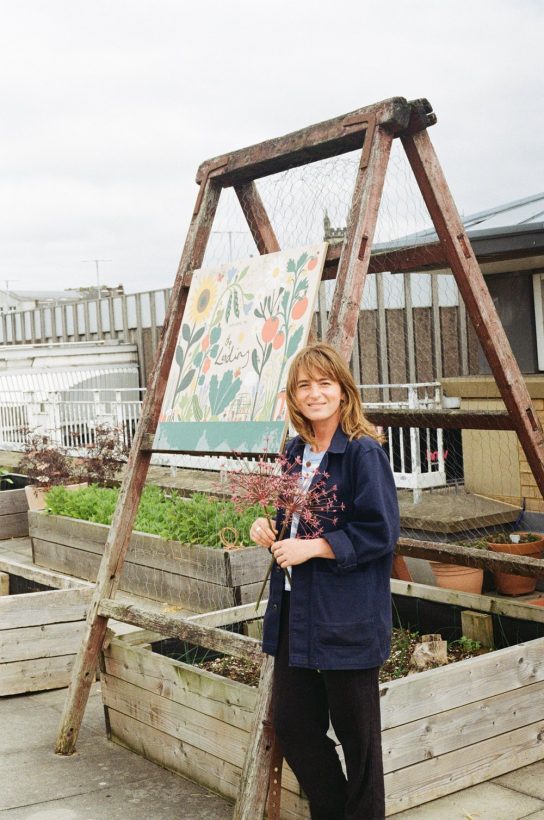
There are many ways in which businesses can foster staff well-being and an oft overlooked one is through investment (of time, not so much money, in this instance) in the physical spaces needed for work and rest. Buckley’s not satisfied all is as it should be. “It’s become chaotic,” he admits. “Jess [Furniss], our new head chef, and I talked about tubs for an hour and a half today, as only chefs can. Cambro make storage tubes that will make this fermentation room and the fridge very organised and easy to work in, which creates a space in the brain to be more creative.”
As a business owner Buckley is, quite literally, hands-on. WTLGI has only just reopened following a series of pop-ups at Kampus in Manchester. Buckley spent a full week there himself, deep-cleaning the space, even taking a toothbrush to the fridges to get them spick and span. “It’s ten years so we’re starting to look a bit tired. We haven’t got any money to do a whole new kitchen refurb so if I can’t do that, I need to make it work as well as possible.”
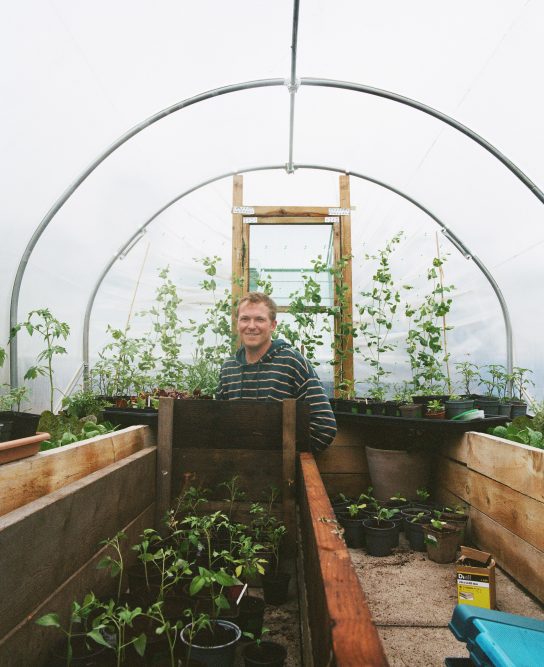
This raises a wider question. Given the squeeze on resources in restaurants, how realistic is it for business owners to invest in something the guest doesn’t see? “It’s important from a human point of view. What do we have if we don’t have that?” he says. “Raising wages which we’re doing, it’s not helping because of the rate of inflation. If you haven’t got the park to go to, that time with your kids, that togetherness…those things are going to be really important because that’s all we’re going to have left and they don’t cost money. We won Restaurant of the Year [in the Manchester Food and Drink Awards], the restaurant retained its Michelin Green Star, but I couldn’t afford to take the team out for a celebration meal. Isn’t that sad? The best restaurant two years running…you’d think that that restaurant would be able to take the team out and have a big celebration. We didn’t have the money in the bank.”
Buckley opened WTLGI in an old Victorian coffee warehouse up a cobbled alley in the centre of Stockport in October 2016. Within six months, the restaurant had been declared ‘the best restaurant you’ve never heard of’ by GQ and been awarded a perfect ‘ten’ by Marina O’Loughlin then at The Guardian. It’s striking that many of the conversations that the industry is having today around sustainability, people, gender bias, zero waste, and community, Buckley was having back then.

“From a very young age, I always said that it would be important to me that I did something I enjoyed. Cooking is not just a job, it’s a vocation, it’s a way of life, if you fall in love with it. That’s why [people work] the long hours. It’s easy to exploit that kind of passion and joy. It’s the same in any creative industry. I’ve got friends who are artists or writers or dancers who are never off the clock. These guys [the WTLGI team] need to be off the clock.”
Buckley has long been a proponent of a four-day week. “I was talking to Tom Barnes [of Skof, with whom Buckley worked at L’Enclume] and we were remembering how nervous you’d be leaving your section. I’d be so nervous that I’d left someone in the weeds, or you’d be really angry that someone left you in the weeds. On my days off I’d just be really worried. There’s always that friction between shifts. Fundamentally, working together, as one solid team, like a hive, it’s just full accountability all the time.
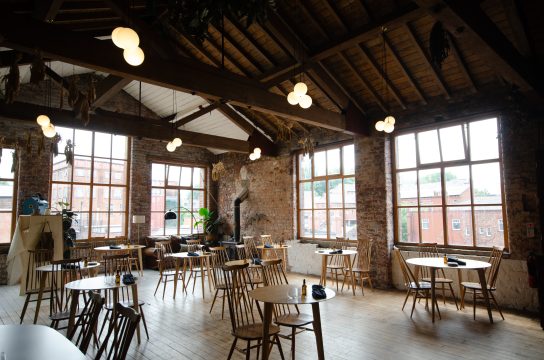
WTLGI has a solid team of 16, including creative director Kat Wood who started front of house, and Jess Furniss, recently promoted to head chef from pastry chef, replacing Callum Higgins who has just left after starting as a chef de partie five years ago. Recruiting from within works well, says Buckley, who himself worked for Gary Rhodes, Paul Kitching, and Simon Rogan. “This restaurant comes with quite a culture to it. Probably a lot of restaurants do. I think people have to understand and live in that culture for a little while. It makes the restaurant stronger if they’re coming through that way. Sometimes, bringing in chefs over the top can create ego battles.”
Training and education are, therefore, a core part of WTLGI. “I want people to leave knowing how to break down a pig and understand why we’re doing it, that’s always been an ambition.” Wine-training, preservation techniques, and fermentation are also on the curriculum, as well as weekly sessions at The Landing CIC, WTLGI’s community garden.

What, I wonder, does he think could be improved? “Everything, every day, everything”. And who does he look to, then, for inspiration? “St. John,” he says without a beat. “There’s people there that have been working there for 25 years. It’s got such an amazing identity. If you had a six-year-old draw a restaurant, that’s what it would look like. They’ve had the same uniform for 25 years; the plates they know where they get them from; the jugs, they know where they get them from. It sounds nuts but all that’s taken care of so you can just come in and do your job. We’re trying to set up systems all the time and it’s just confusing, it takes brainpower. I know it’s an odd answer!” He also speaks in praise of intergenerational brigades such as St. John’s where you’ll see established chefs in their fifties working alongside twentysomething newcomers to the industry. “Any restaurant that can support a family…Our GM’s just had his second kid and Jess, one of our chefs, has just bought her first house. That makes me really proud.”


